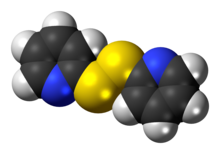2,2′-Dipyridyldisulfide, sometimes known as DPS, is used for preparing thiols[1][2] and activating carboxylic acid for coupling reactions, as in the following reaction:[3]

| |

| |
| Names | |
|---|---|
| Preferred IUPAC name
2,2′-Disulfanediyldipyridine | |
| Other names
1,2-Di(pyridin-2-yl)disulfane (not recommended)
2,2′-Dipyridyldisulfide 2,2′-Dipyridyldisulphide Aldrithiol-2 | |
| Identifiers | |
3D model (JSmol)
|
|
| ChEBI | |
| ChEMBL | |
| ChemSpider | |
| ECHA InfoCard | 100.016.676 |
| EC Number |
|
PubChem CID
|
|
| UNII | |
CompTox Dashboard (EPA)
|
|
| |
| |
| Properties | |
| C10H8N2S2 | |
| Molar mass | 220.31 g·mol−1 |
| Melting point | 56 to 58 °C (133 to 136 °F; 329 to 331 K) |
| Hazards | |
| Occupational safety and health (OHS/OSH): | |
Main hazards
|
Irritant (Xi) |
| GHS labelling: | |

| |
| Warning | |
| H315, H319, H335 | |
| P261, P264, P271, P280, P302+P352, P304+P340, P305+P351+P338, P312, P321, P332+P313, P337+P313, P362, P403+P233, P405, P501 | |
Except where otherwise noted, data are given for materials in their standard state (at 25 °C [77 °F], 100 kPa).
| |
Uses
editIt is also used in molecular biology as an oxidising agent, for example to oxidise free thiols to form disulfide bonds in proteins.
References
edit- ^ Futaki S. and Kitagawa K. (1994). "Peptide-Unit Assembling Using Disulfide Cross-Linking - a New Approach for Construction of Protein Models". Tetrahedron Lett. 35 (8): 1267–1270. doi:10.1016/0040-4039(94)88040-9.
- ^ "Special Reagents for Thiol Groups". Aldrichimica Acta. 4 (3): 33–46.
- ^ Thalmann A., Oertle K. and Gerlach H (1985). "Ricinelaidic acid lactone". Org. Synth. 7: 470. doi:10.15227/orgsyn.063.0192.
